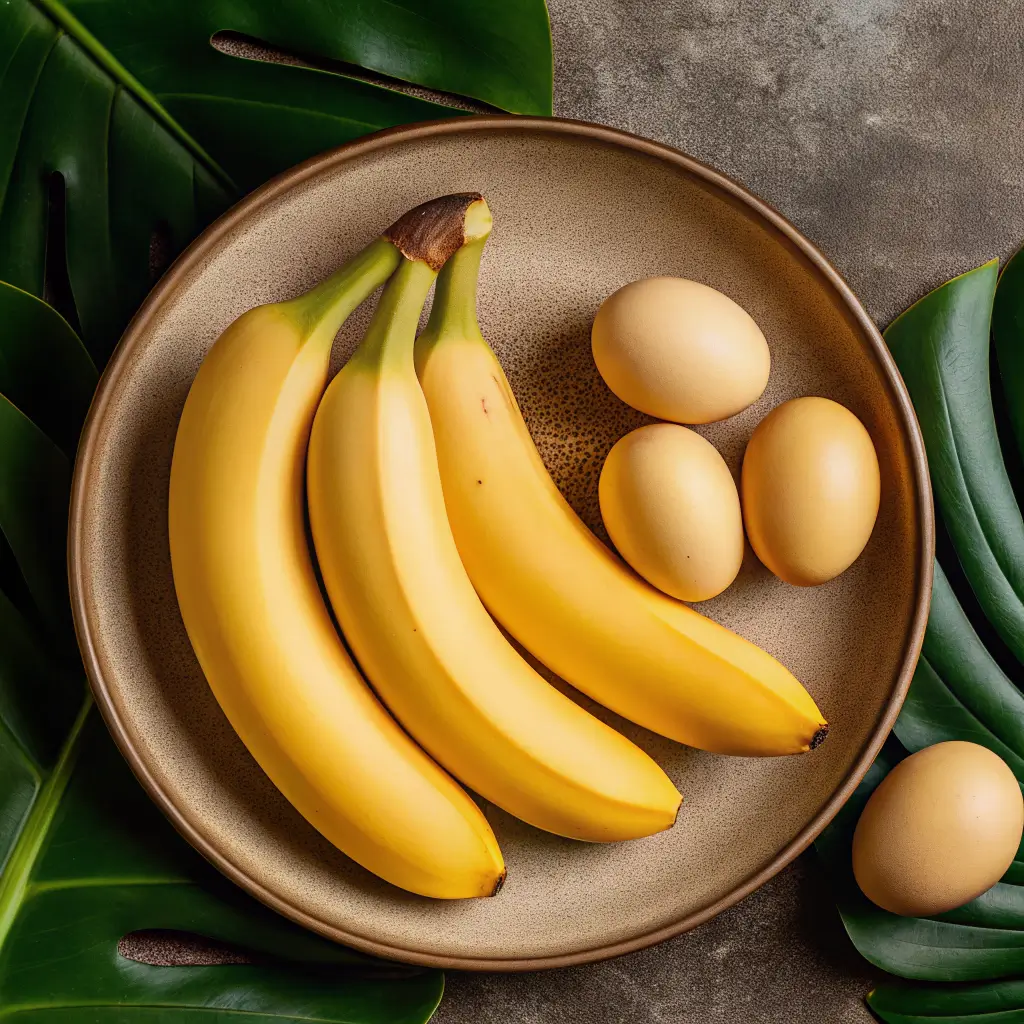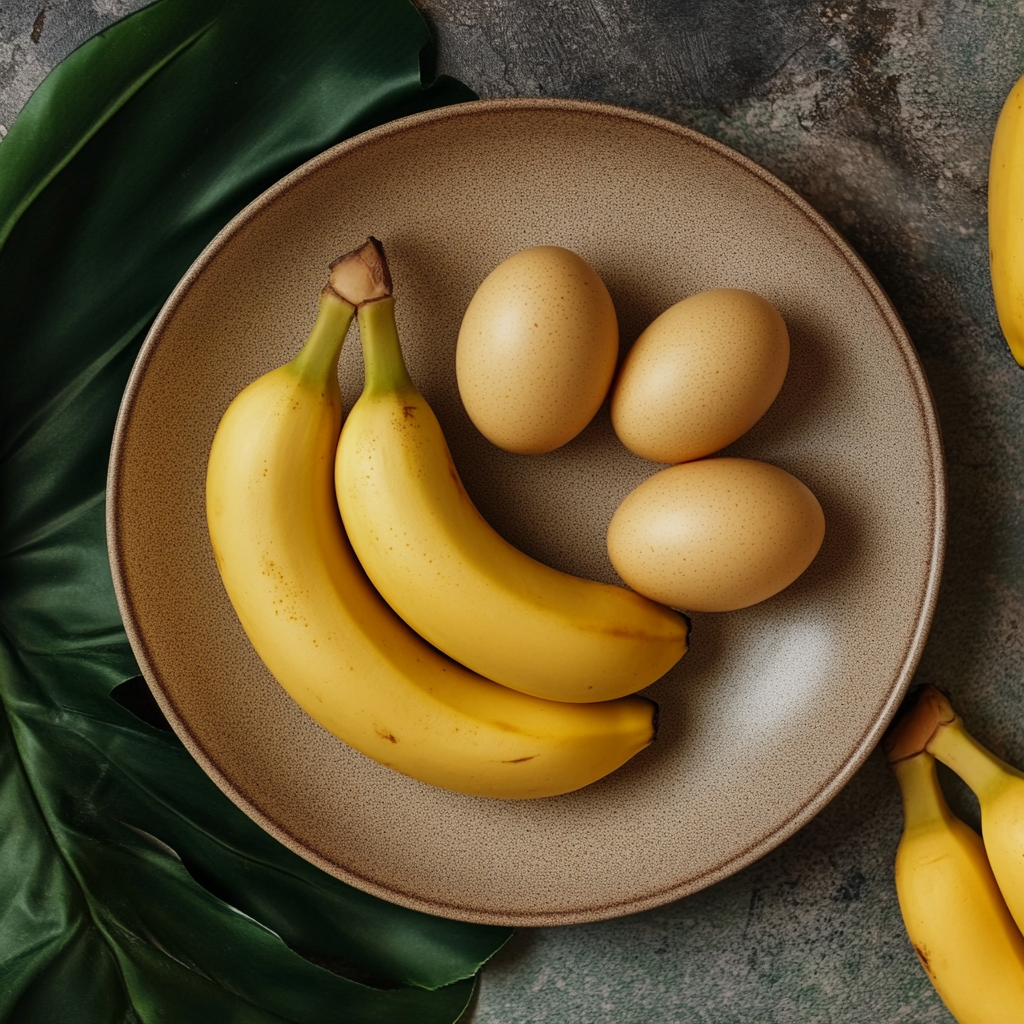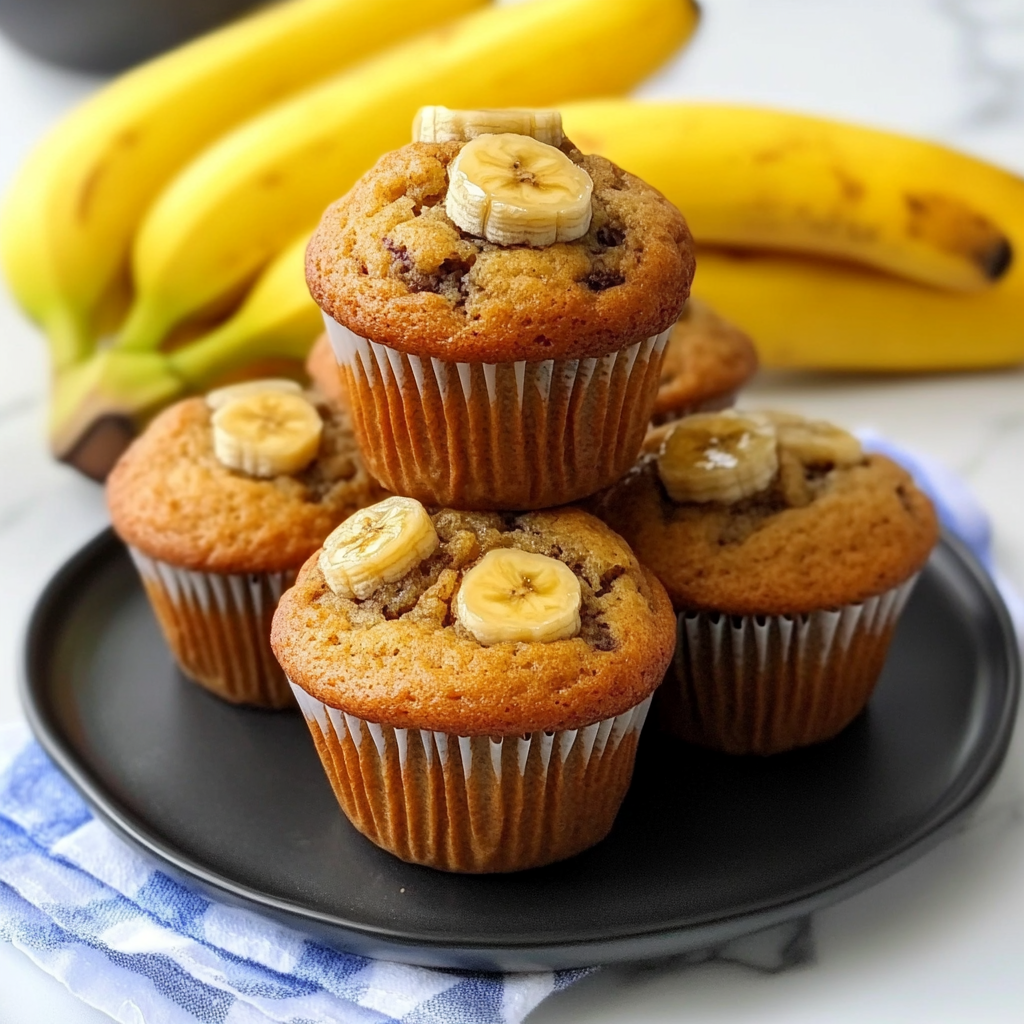Understanding how much banana to replace egg in baking is essential for achieving the perfect texture and consistency in your recipes. Whether you’re exploring vegan alternatives, managing food allergies, or simply out of eggs, bananas provide a versatile solution. On average, 1/4 cup of mashed banana can effectively replace one egg in most baking applications. However, the ripeness of the banana and the type of recipe can significantly influence the final outcome, making it important to adjust accordingly.
Table of contents
The Science Behind Using Bananas as Egg Replacements
The question of how much banana to replace 1 egg in baking involves understanding the science behind this substitution. Eggs serve multiple purposes in baking: they bind ingredients, add moisture, and sometimes act as a leavening agent. Bananas, while primarily known for their sweetness, can replicate these functions due to their unique chemical composition.

Bananas are rich in pectin and natural sugars, which help bind dry ingredients and retain moisture. Their creamy texture mimics the viscosity of eggs, making them a practical substitute. However, unlike eggs, bananas lack the proteins needed for significant structure, which can slightly alter the texture of baked goods.
Why Use Bananas Instead of Eggs?
Choosing how much banana to replace 1 egg in baking often stems from dietary preferences or necessity. Here are some reasons why bananas are a popular substitute:
- Vegan-friendly: Bananas allow bakers to eliminate animal products, aligning with plant-based diets.
- Cost-effective: Eggs can be expensive, while bananas are typically affordable and widely available.
- Nutritional benefits: Bananas are rich in potassium, vitamin B6, and dietary fiber, making them a healthier alternative to eggs.
- Allergy-friendly: For those with egg allergies, bananas provide a safe and tasty option.

While bananas are a great replacement, they also impart their distinct flavor to baked goods. This subtle sweetness can complement recipes like muffins, pancakes, and quick breads. Additionally, bananas’ moisture content helps prevent dryness, enhancing the overall texture of your creations. By understanding the advantages of bananas over eggs, you can make informed choices for your baking needs.
How to Measure Bananas for Baking Substitutions
Accurately measuring how much banana to replace 1 egg in baking ensures consistent results. The standard substitution is 1/4 cup of mashed banana, equivalent to one medium-sized banana. Here’s how to measure correctly:
- Choose ripe bananas: Use bananas with brown spots for optimal sweetness and mashability.
- Mash thoroughly: Use a fork or blender to achieve a smooth consistency.
- Measure precisely: Use a measuring cup to ensure you have exactly 1/4 cup.
Tips for Precision:
- If the banana is too large, measure the excess and store it for future use.
- For recipes requiring multiple eggs, scale the banana accordingly, keeping in mind that too much banana can alter the recipe’s moisture balance.
Proper measurement helps you maintain the intended texture, ensuring your baked goods are neither too dense nor overly moist.
Step-by-Step Guide: Replacing Eggs with Bananas
Using how much banana to replace 1 egg in baking effectively requires a systematic approach. Follow these steps for foolproof results:
- Select the right recipe: Opt for baked goods where moisture and binding are key, such as muffins, cookies, or pancakes.
- Prepare the banana: Mash a ripe banana until smooth, ensuring no lumps remain.
- Measure accurately: Use 1/4 cup of mashed banana per egg in the recipe.
- Adjust other ingredients: Reduce sugar slightly if the banana is overly sweet. Consider decreasing liquids to prevent excess moisture.
- Incorporate gradually: Add the mashed banana during the wet ingredient stage, mixing thoroughly for even distribution.

This straightforward process simplifies the substitution, making it accessible for bakers of all skill levels, one of my recipe Banana Muffins No Egg
Adjusting Recipes When Using Bananas for Eggs
Determining how much banana to replace 1 egg in baking is only the first step. Adjusting the recipe ensures that flavors and textures align with your expectations. Here’s what to consider:
Key Adjustments:
- Sweetness: Bananas are naturally sweet, so reduce added sugar by 1–2 tablespoons per substituted egg.
- Moisture: To avoid overly moist baked goods, decrease liquid ingredients like milk or water by 10–15%.
- Leavening agents: Add 1/4 teaspoon of baking powder or soda per banana to improve rise.
Testing small batches allows you to refine these adjustments, ensuring the best results. With practice, modifying recipes for banana substitutions becomes second nature.
Banana as a Binding Agent: How It Works
The ability of bananas to bind ingredients makes them a popular choice for replacing eggs. Understanding how much banana to replace 1 egg in baking requires knowledge of their binding properties.
Bananas contain pectin, a natural fiber that gels when combined with moisture. This gelling effect helps hold ingredients together, similar to how eggs function. Additionally, the natural sugars in bananas caramelize during baking, contributing to structure and stability.
However, bananas lack the elasticity of egg proteins, which can lead to denser baked goods. Despite this limitation, their binding capabilities make them ideal for recipes where a soft, moist texture is desirable. By leveraging bananas’ unique properties, you can create cohesive, flavorful baked goods without eggs.
Do Bananas Impact the Flavor of Baked Goods?
One common concern when exploring how much banana to replace 1 egg in baking is whether the banana flavor will dominate. The answer largely depends on the recipe and banana ripeness.
Flavor Considerations:
- Mild recipes: In delicately flavored recipes like sugar cookies, the banana’s sweetness may be more noticeable.
- Bold recipes: In spiced cakes or chocolate brownies, the banana flavor is often masked by stronger ingredients.
If the flavor is a concern, opt for less ripe bananas, which are milder and less sweet. You can also experiment with adding extracts or spices to complement or balance the banana’s taste. By tailoring your approach, you can seamlessly integrate bananas into your baking without overwhelming the intended flavor profile.
Recipes That Work Best with Bananas as Egg Replacements
Using bananas as an egg substitute is ideal for recipes where their natural sweetness and creamy texture can enhance the final product. The general rule is to use 1/4 cup of mashed banana (about half a medium-sized banana) to replace one egg. Here’s a breakdown of the types of recipes that shine when bananas take center stage:
- Quick Breads: Banana bread and zucchini bread benefit from the added moisture and binding properties of mashed bananas.
- Muffins and Cakes: Recipes with fruity or spiced flavors pair well with the subtle taste of bananas.
- Pancakes and Waffles: The creamy texture of bananas ensures a fluffy outcome.
- Brownies: Bananas help create a gooey texture without the need for eggs.
Keep in mind, the natural sweetness of bananas might alter the flavor profile. For savory recipes, the banana’s sweetness can clash, so choose recipes thoughtfully. Always remember, how much banana to replace 1 egg in baking depends on the recipe’s texture and flavor balance.
Substituting Bananas for Eggs in Cakes, Muffins, and Pancakes
The success of replacing eggs with bananas in cakes, muffins, and pancakes often depends on the proportions and techniques used. When determining how much banana to replace 1 egg in baking, the standard 1/4 cup of mashed banana works well. However, there are nuances to consider:
- Cakes: Since bananas add moisture, balance this by slightly reducing other liquid ingredients.
- Muffins: Bananas help bind ingredients while keeping muffins tender. Add a teaspoon of baking powder for better leavening.
- Pancakes: Bananas contribute to fluffiness and act as a binder. Mix the mashed banana thoroughly to avoid lumps.
Always test the batter’s consistency, ensuring it’s not overly dense. Adjust baking times as bananas might slightly lengthen cooking time. Understanding how much banana to replace 1 egg in baking will ensure your creations turn out perfectly each time.
Leavening Adjustments When Substituting Bananas for Eggs
Eggs play a crucial role in leavening, especially in cakes and muffins. Bananas, while excellent binders, lack the leavening power of eggs. To compensate, use additional leavening agents:
- Baking Powder: Add 1/2 teaspoon of baking powder per replaced egg.
- Baking Soda: Combine 1/4 teaspoon of baking soda with 1 teaspoon of lemon juice or vinegar to create extra lift.
Consider the recipe’s existing structure. If it relies heavily on eggs for volume, substituting bananas might not achieve the desired height. Always evaluate the balance of ingredients when deciding how much banana to replace 1 egg in baking, ensuring the final texture meets your expectations.
Common Mistakes to Avoid When Replacing Eggs with Bananas
Mistakes when substituting bananas for eggs can lead to subpar results. Here are common pitfalls and how to avoid them:
- Using Too Much Banana: Overestimating how much banana to replace 1 egg in baking can result in overly dense or mushy textures.
- Ignoring Flavor Impact: Bananas have a distinct taste that might not complement all recipes. Test small batches when uncertain.
- Skipping Leavening Adjustments: Without proper adjustments, baked goods may turn out flat.
- Using Overripe Bananas Incorrectly: While overripe bananas are excellent for binding, their sweetness can overpower delicate flavors.
By avoiding these mistakes, you’ll master the art of using bananas as an egg substitute in no time.
Are Bananas Healthier Than Eggs in Baking?
When comparing bananas and eggs in baking, each offers unique benefits. Bananas are rich in potassium, fiber, and natural sugars, making them a nutritious option. On the other hand, eggs provide high-quality protein and essential vitamins like B12 and D.
Key Benefits of Using Bananas:
- Lower in calories and fat than eggs.
- Naturally sweet, reducing the need for added sugar.
- Rich in antioxidants.
However, eggs are superior in providing structure and leavening. Deciding how much banana to replace 1 egg in baking often boils down to dietary preferences and recipe requirements.
Can You Use Frozen Bananas as an Egg Substitute?
Frozen bananas can replace eggs, but they require proper preparation. Thaw the banana completely and drain excess liquid before mashing. This ensures the substitution aligns with the 1/4 cup rule for how much banana to replace 1 egg in baking. Here are tips for using frozen bananas effectively:
- Thaw in Advance: Avoid microwave thawing, as it may overheat the banana.
- Mash Thoroughly: A smooth consistency ensures even distribution in the batter.
- Adjust Liquids: Frozen bananas can add extra moisture, so reduce other liquids slightly.
With these adjustments, frozen bananas work just as well as fresh ones.
Bananas vs. Other Egg Alternatives: A Comparison
When considering how much banana to replace 1 egg in baking, it’s helpful to compare bananas with other common egg substitutes:
- Applesauce: Works similarly to bananas but with a milder flavor.
- Flaxseed Meal: Provides a nutty taste and is excellent for binding but lacks the sweetness of bananas.
- Silken Tofu: Offers creaminess without altering flavor.
- Yogurt: Adds tanginess and moisture but doesn’t enhance sweetness like bananas.
Bananas are ideal for sweet recipes due to their flavor and binding properties, making them a favorite for many bakers.
FAQs About Using Bananas as Egg Substitutes
How much banana to replace 1 egg in baking?
The standard replacement is 1/4 cup of mashed banana for one egg.
Can bananas be used in all baking recipes?
No, bananas are best for sweet recipes like cakes, muffins, and pancakes. They might not work well in savory dishes.
Do bananas alter the flavor of baked goods?
Yes, bananas add sweetness and a distinct flavor that might not complement all recipes.
Can I use overripe bananas as an egg substitute?
Absolutely! Overripe bananas are ideal for baking due to their sweetness and soft texture.
Do bananas impact the baking time?
Yes, they may extend the baking time slightly due to their moisture content.

